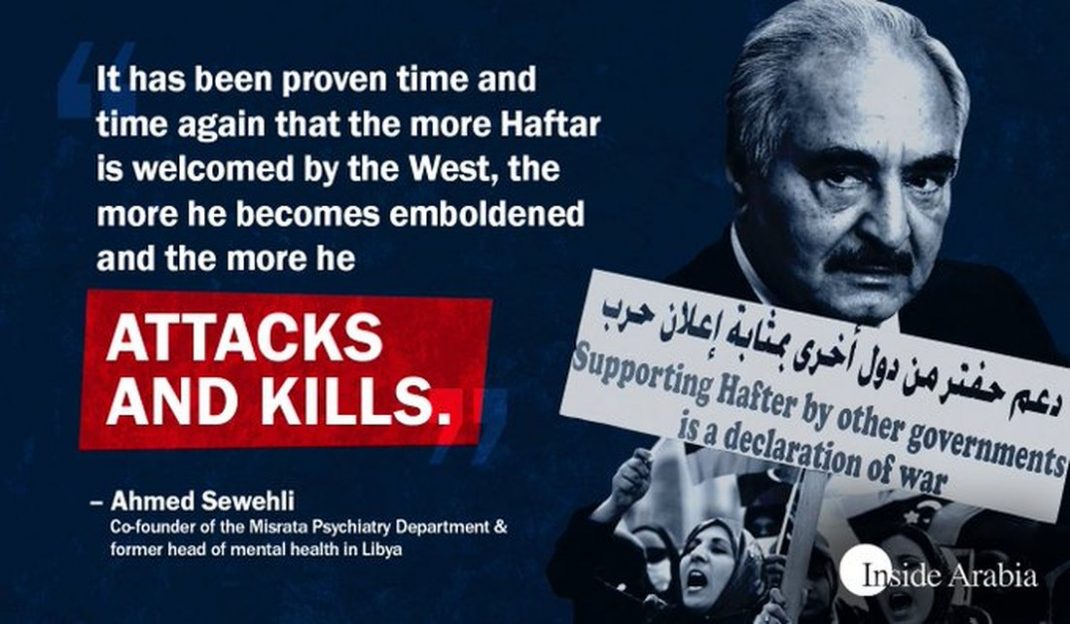By CJ Werleman
 An international agreement to address the international factors behind Libya’s woes has only succeeded in further normalizing North Africa’s worst war criminal, thus promising further bloodshed.
An international agreement to address the international factors behind Libya’s woes has only succeeded in further normalizing North Africa’s worst war criminal, thus promising further bloodshed.
The International Criminal Court (ICC) issued an arrest warrant in 2017 for General Khalifa Haftar, a self-styled Nazi-like field marshal who leads some of the most violent militias in North Africa, for carrying out war crimes and crimes against humanity in Libya. Furthermore, a US court has summoned him for ordering the killing of more than 1,000 civilians in the Libyan capital Tripoli.
Barely more than two years later, however, Haftar, a citizen of the United States, finds himself in Berlin, Germany, credited as the leader of the Libyan National Army (LNA), an anti-government insurgency, as a legitimate voice in the conflict over the future of the long-suffering Libyan people.
The global headlines lauded the respective foreign powers for reaching a “landmark” agreement to limit external interference in the country’s 5-year civil war and to push its warring factions towards a peaceful end to the fighting.
In attendance at the January 19 conference, were senior officials from the US, UK, France, Russia, Italy, Turkey, Egypt, United Arab Emirates, China, Algeria, Republic of Congo, and representatives from the United Nations, European Union, and African Union.
“We reached an agreement on a comprehensive plan to support a ceasefire in Libya,” said the German Chancellor Angela Merkel. “We all agree that we should respect the arms embargo and that the arms embargo should be controlled more strongly than it has been in the past.”
Tellingly, she confirmed that detailed discussions regarding avenues for punishing violators of the agreement were absent, which constitutes an alarming omission given Haftar’s criminality has taken place with covert support from France, UAE, Russia, and Egypt.
When I spoke with Ahmed Sewehli, co-founder of the Misrata Psychiatry Department and the former head of mental health in Libya, who attended but did not participate in the conference, he told me, “An arms embargo does not stop UAE’s ongoing supply of weapons to Haftar through the Egyptian land border. The reason why Haftar is attacking Tripoli is because he has never abided by any law or agreement, and has no problem committing war crimes to become a dictator.”
None of these factors, however, has stopped the Brookings Institute, a US based neoliberal think tank, from describing the conference as the “most serious attempt in years to address the international factors behind Libya’s woes.”
Sewehli described the invitation of Haftar to Berlin as a “shameful day in the history of post-war unified Germany,” adding, “It has been proven time and time again that the more Haftar is welcomed by the West, the more he becomes emboldened and the more he attacks and kills.”
Also, telling is the fact that France scuttled the conference’s aim to issue a joint statement that would’ve condemned Haftar’s closure of Libya’s oil ports, leaving the other attendees to issue individual statements.
“It appears that the supporters of the criminal Haftar are still on their positions after the Berlin statement,” tweeted Mr. Ashraf Shah, Libya’s former adviser of High Council of State, on Sunday.
Using the “war on terror” as a fig leaf to cloak their respective military support for Haftar with a veneer of credibility, France, UAE, Egypt, and Russia have claimed he was the right man to battle “Islamic extremists” in Libya, which is an absurdity given his militias comprise some of the most ruthless, violent and anti-democratic extremists.
“These militias from neighboring towns under the command of warlord General Haftar are using the method of ethnic cleansing to pursue their agenda and prevent the Libyan people from achieving democracy,” Ghaith al-Sanusi, a Libyan activist from the city of Derna, told me when we spoke last year.
External support for Haftar is almost exclusively motivated by the lure of Libya’s vast oil reserves. In fact, it’s a straight up grab for the country’s natural resources, which is why his external supporters have been encouraging the warlord and wannabe future dictator to seize as much territory as possible.
Despite having failed to take Tripoli after waging a siege on the capital since April, Haftar has been successful in taking control of most of Libya’s oil, having seized the ports of Es Sidra, Ras Lanuf, and Zueitina, which have allowed him to establish a parallel government.
“I don’t think ideology really plays any significant role in the conflict. If anything, ideology tends to be a layer, an excuse that both sides tend to use to increase their legitimacy, especially internationally … What really matters is money; it’s all about controlling the rents, whether it’s oil or access to foreign currency.
Militias have been fighting [against] each other … because they need and they want access to the rents in order to redistribute it and to effectively support their patronage networks,” Riccardo Fabiani, a Geopolitical analyst at Energy Aspects, told Al Jazeera.
“People like Haftar – but this also happens on the other side – use ideology to boost their own legitimacy in the eyes of partners like Saudi Arabia and the UAE.”
Ultimately, previous multilateral efforts to bring an end to the fighting in Libya have failed because external competition for the country’s oil has remained too great to ignore, and thus there’s no reason to believe an agreement that lacks punitive measures for arming Haftar will provide remedy.
Delegitimizing and ending military support for his violent thugs is the only way forward. Normalizing him, as the conference in Germany has done, ensures only further bloodshed while putting the country back on track to being ruled yet again by a bloodthirsty dictator.
To be sure, Haftar has already violated the terms of the ceasefire, moving his forces towards Misrata, and then shelling the city, killing several civilians.
***
CJ Werleman– Columnist for Middle East Eye and Byline Times. Host of Channel TheRage, Activist against Islamophobia.
__________





